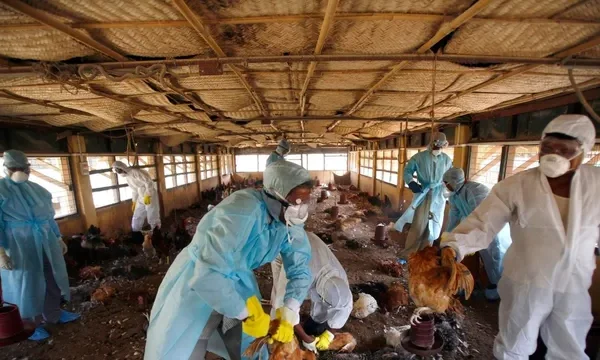
Nagpur: The Second Capital of Maharashtra has once again been hit by H5N1 avian influenza (bird flu) after three poultry samples from Bada Tajbagh tested positive on Wednesday. Authorities have sprung into action, implementing containment measures to curb the spread of the virus.
One-kilometre zone declared as bird flu-affected
Following the detection of the H5N1 virus in a dead rooster, the Nagpur Municipal Corporation (NMC) swiftly declared a one-kilometre radius in Bada Tajbagh, under Sakkardara Police Station’s jurisdiction, as a bird flu-affected zone. Culling operations of poultry have begun in the area to prevent further transmission.
The infected bird’s tracheal swab and droppings were sent for testing to the ICAR-National Institute of High Security Animal Diseases (NIHSAD), Bhopal, and the Western Regional Disease Diagnostic Laboratory (WRL), Pune. Both laboratories confirmed the presence of H5N1 avian influenza virus. In response, the administration sealed the house where the infected bird was found and extended surveillance across the affected zone.
Following standard operating procedures (SOPs) for avian flu outbreaks, a Rapid Action Force (RAF) of the NMC has been deployed to cull all poultry birds within the affected zone. Additionally, an area covering a nine-kilometre radius around the hotspot has been marked as a surveillance zone. As per protocol, poultry eggs and bird feed in the area are also being destroyed to eliminate potential sources of infection. Around 1,500 birds are expected to be culled, sources said.
Health precautions and monitoring underway
District Collector Dr. Vipin Itankar assured that there is no need to panic, as stringent measures are in place to contain the outbreak. He stated that Tamiflu medication will be administered to all individuals who may have come into contact with infected birds, including adults, adolescents, children, and infants.
Authorities have also initiated an influenza-like illness (ILI) survey within a two-kilometre radius of Bada Tajbagh to monitor symptoms and identify potential human infections. The Rapid Response Team (RRT) has been directed to ensure the scientific disposal of poultry, eggs, and feed from the affected area, while disinfection and sanitisation efforts are being intensified.
The administration remains on high alert, closely monitoring the situation to prevent any further escalation. Meanwhile, citizens have been urged to report any unusual poultry deaths and follow hygiene precautions while handling birds.













